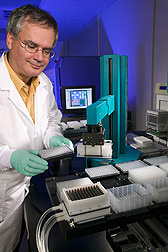This page has been archived and is being provided for reference purposes only. The page is no longer being updated, and therefore, links on the page may be invalid.
Sweetpotatoes Get High-Tech Help
By Jan SuszkiwNovember 5, 2009
An Agricultural Research Service (ARS) computational molecular biologist in Mississippi is launching a project to create a genomics toolkit to help plant breeders develop new varieties of sweetpotato. Brian Scheffler and his colleagues will use the state-of-the-art equipment at the ARS Genomics and Bioinformatics Research Unit in Stoneville, Miss., to develop and locate DNA markers on the 90 chromosomes of sweetpotato.
Sweetpotato, the world’s seventh most important food crop, is extremely important to global food security, according to Scheffler. Yet very little genomics information is available in a form that sweetpotato breeders can use to develop new varieties for enhanced nutrition or improved resistance to stresses brought about by climate change, adverse environmental conditions, or pests and diseases.
Scheffler will receive $120,000 in funding through the agency’s 2010 T.W. Edminster Award to pay for a two-year postdoctoral research associate to work with him on the sweetpotato project. The award, named for a former ARS administrator, enables postdoctoral researchers to work closely with experienced scientists in their fields of interest, as well as conduct high-priority research on pressing agricultural issues. The Edminster Award is presented to the highest-ranked research proposal among 50 proposals selected for funding through ARS’ annual Postdoctoral Research Associates Program. ARS scientists submitted 450 proposals to this year’s program.
In addition to creating genetic maps of sweetpotato, Scheffler and his postdoctoral associate will use a high-throughput DNA sequencer to develop a sweetpotato microarray for studying where, when and how certain genes are expressed. Of particular interest are genes affecting rhizome (underground stem) production in sweetpotato, especially during stress related to environmental factors such as drought.
The markers, microarrays and gene expression data will constitute the “tools” in the genomics toolkit, and should enable sweetpotato breeders to speed their identification and integration of important new traits into their elite breeding lines.
In addition to providing funding for Scheffler’s project, this year’s ARS Postdoctoral Research Associates Program will fund projects on assessing host specificity in aphid parasitoids, developing novel controls for stable flies, and improving drought tolerance in wheat.
ARS is the principal intramural scientific research agency of the U.S. Department of Agriculture (USDA). The sweetpotato project supports the USDA research priority of ensuring international food security.

